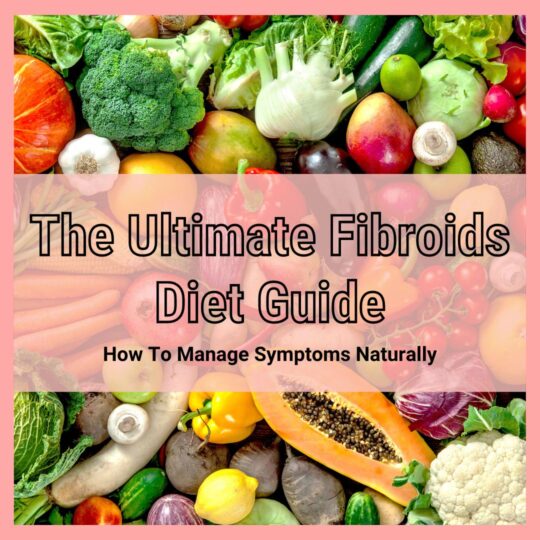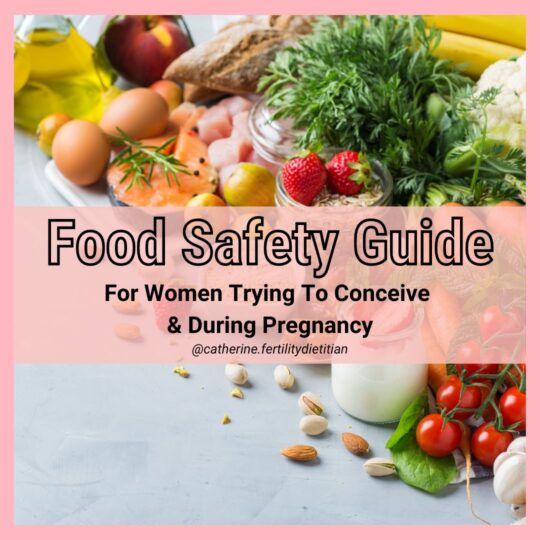The Ultimate Guide To A PCOS Diet – How To Get Pregnant With PCOS
What is PCOS?
PCOS (Polycystic Ovary Syndrome) is a hormonal condition commonly associated with increased insulin and androgens hormones (male-type hormones). This hormonal imbalance can affect women’s fertility and make it more difficult to conceive. In this blog post, we will share three simple diet tips on how to get pregnant with PCOS.
What are the symptoms of PCOS?
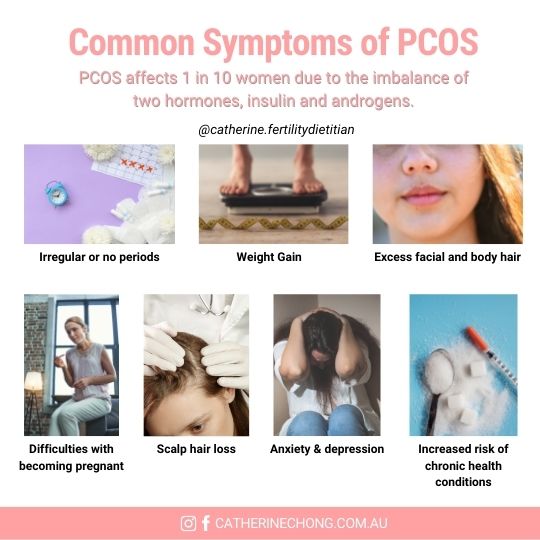
PCOS is the most common endocrine disease affecting women of reproductive age in modern society. The symptoms and severity of PCOS can vary slightly between women, and it can be caused by a combination of genetic and environmental factors, including:
- Irregular or no periods
- Weight gain
- Excess hair growth on the face, stomach and back
- Hair loss
- Acne
- Taking longer to fall pregnant
A 2017 Australian study found that between 8-12% of Australian women aged 16-29 years old suffer from the condition. However, PCOS is quite a complex hormonal condition with many complications. There is currently a lack of clear and consistent diagnostic criteria, making it challenging to know the true prevalence of the disease.
How does PCOS affect your chance of getting pregnant?
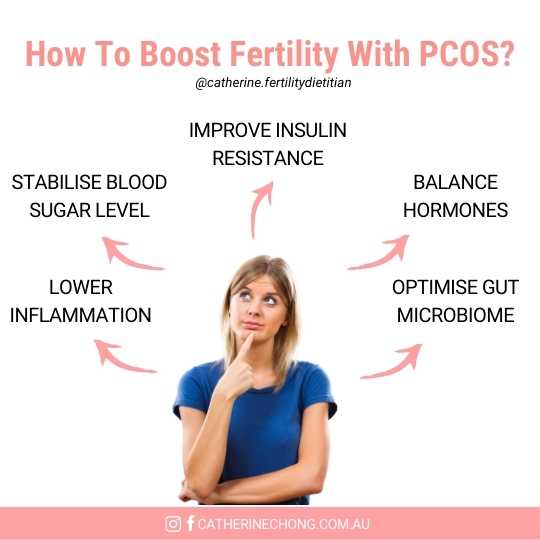
Many think that PCOS means you have multiple ”cysts” on your ovaries, which is a common myth, and they are no ”cysts” at all, and it’s just a high number of eggs present or seen on an ultrasounds scan.
The ovaries are two small, oval-shaped reproductive organs in a woman’s pelvis. Every month, when the egg is mature, the ovaries release an egg (known as ”ovulation”), and the egg is ready to be fertilised by the sperm in the fallopian tube.
In women with PCOS, the eggs don’t grow properly, and they are caused by the increased level of male-type hormones (androgens). These high amounts of hormones can also prevent the egg from releasing from the ovaries, causing ovulation to stop completely, making it more difficult for women with PCOS to get pregnant.
If you have high insulin hormone levels in your body, it can increase the production of androgens, such as testosterone, in the ovaries. And hence, treating the root cause of PCOS by balancing insulin and androgens hormones is the key.
How To Get Pregnant With PCOS – Top Diet Tips
Adopting healthy eating and lifestyle is the first-line approach to help to get pregnant with PCOS. What you eat plays an essential role in managing PCOS. Losing some excess weight if you’re overweight may also help improve the hormone levels and your ability to conceive.
Now, let’s look at four dietary tips to help manage your symptoms and increase your chances of getting pregnant with PCOS.
1. Switch to Low-GI foods
The best way to manage PCOS is to start by opting for low-GI foods. GI stands for Glycemic Index, and this relates to how carbohydrates affect blood sugar levels. There are three classifications for GI ranking system:
Low: 55 or less
Mid: 56 – 69
High: 70+
Carbohydrates are an essential part of our diet as they provide fuel for the brain and energy for our body to function. However, not all carbohydrates food are of the same quality.
If you’re consuming more high GI food, it causes your blood sugar level to spike, which means your body needs to release more insulin hormones to help your body lowers your blood sugar by storing the glucose in cells.

The high insulin levels can signal the ovaries to produce more male-type hormones. You’re also likely to quickly gain more weight over time, especially in the abdominal area, as insulin is a fat-storage hormone.
It’s essential to limit your intake of highly processed and refined carbohydrates such as white flour, white rice and white bread, and discretionary foods like potato chips, chocolate and sugar-sweetened beverages. And start by swapping to healthier low GI food choices:
- Bread: Look for bread where you can see lots of grains – whole grain/multigrain bread, bread with seed, sourdough bread or wholegrain high fibre wraps
- Breakfast Cereals: Rolled or steel-cut oats, natural muesli or wholegrain high fibre cereals
- Pasta: Durum wheat pasta cooked ”al dente.”
- Rice: Low GI brown rice, basmati rice, black rice, quinoa, buckwheat, pearl couscous
- Crackers: Whole grain high fibre crackers, grain and seed crackers
2. Optimise gut microbiome
Your gut microbiome comprises trillions of live microorganisms and their genetic material within your gut. These microorganisms play a crucial role in digesting food help with absorbing and synthesising nutrients.
Research has recently found a link between the gut microbiome among women with PCOS and those without PCOS. Ensuring that you’ve got a healthy gut microbiome is vital to prevent pregnancy-related complications in PCOS women.
There are several things you can do to nourish your gut. The first is to eat more gut-friendly foods – probiotics. Probiotics can come in supplements, nutrition, and beverages with live beneficial bacteria.
Common natural foods rich in probiotics include:
- Yogurt
- Cheese
- Fermented milk (e.g. kefir)
- Fermented foods (e.g. sauerkraut, kimchi, miso, natto and tempeh)
- Kombucha
Apart from probiotic foods, you also need to ensure that you eat a good amount of prebiotic food in your diet. Prebiotic is a type of indigestible fibre that passes through your gut and stimulates the growth and activity of particular ‘good bacteria in the large intestine.
Foods rich in prebiotics are usually fibrous, including:
- Onion
- Garlic
- Asparagus
- Cashews
- Pistachio nuts
- Lentils
- Chickpeas
- Backed beans
- Nectarines
- Custard apples
- Barley
- Oats
3. Maintaining a healthy weight
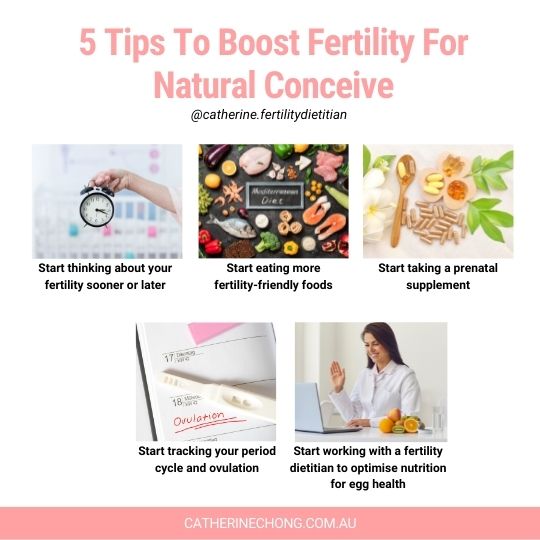
Achieving and maintaining a healthy weight is a significant component in managing PCOS and improving fertility. There has been a strong correlation between PCOS and an inability to lose weight, and carrying excess weight can increase the risk of irregular periods and reduced ovulation.
The good news is losing just 5-10% of body fat may help to restore regularity to the menstrual cycle and ovulation naturally. This also helps to minimise the risk of pregnancy complications such as gestational diabetes.
A fertility dietitian can help you create a personalised weight loss plan and discuss strategies to manage your PCOS best to help you get pregnant.
4. Consider taking an inositol supplement
Inositol is a sugar compound found within the body, and it comes in many different forms. Myo-inositol and D-chiro-inositol are most commonly research linked with PCOS and metabolic health.
Myo-inositol is also naturally present in some foods, which includes:
- Cantaloupe
- Citrus fruits such as; oranges and limes
- Grapefruit
- Blackberries
- Kiwi fruit
- Whole grain bread
- Nuts such as; peanuts and almonds
- Beans including; navy beans and kidney beans
- Peas
Inositol plays an essential biological role in regulating insulin within the body and is directly related to controlling women’s reproductive hormones and weight management. It also acts as an antioxidant within the body, helping to reduce inflammation and oxidative stress.
Evidence suggests that inositol supplementation may help improve insulin sensitivity in people who suffer from insulin resistance. It may also help restore menstrual regularity and ovulation patterns in women with PCOS.
Although this may all sound amazing, the flip side is that the safety of inositol is not entirely known. Some studies report high doses of D-chiro-inositol can affect egg development.
Currently, the best-recommended supplementation ratio of Myo-inositol to D-chiro-inositol is 40:1 and is considered an appropriate approach to help improve fertility outcomes. If you’re thinking of starting any inositol supplement, it’s best to consult with your fertility dietitian.
Need more help? I’ve worked with many women with PCOS to restore ovulation to get pregnant sooner.
I can help you too by creating a personalised nutrition plan tailored to your health conditions and nutritional needs.
With all my love 


